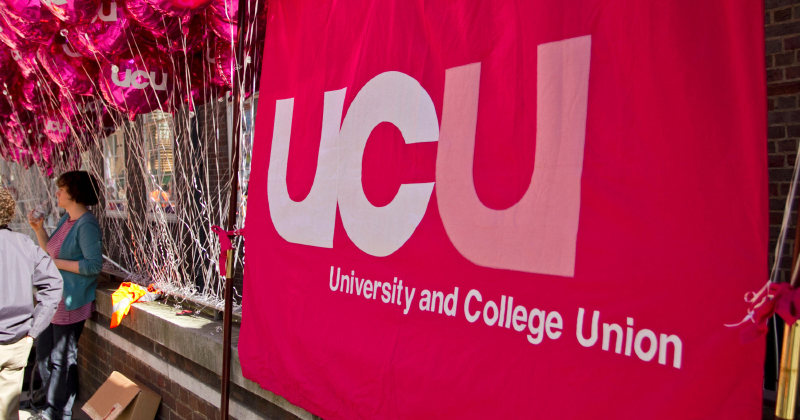FE college teachers could walk out over low pay and high workloads if crunch motions at this weekend’s UCU congress are passed.
Members of the University and College Union will gather for their annual congress in Liverpool to debate motions on industrial action, tackling “excessive” college executive pay, abolishing Ofsted and a potential emergency motion of no confidence in the union’s general secretary Jo Grady.
The union’s further education committee has submitted a motion demanding a national ballot over pay and workload, which comes as teaching and support staff unions prepare to negotiate pay rise recommendations with the Association of Colleges next month.
But due to the large number of motions lodged over the three-day conference, and the union’s experiment to make the congress ‘hybrid’ for the first time, it’s unlikely all motions will be heard.
Member apathy has been floated as a reason for the switch to a hybrid format, where people can take part remotely, insiders say. A motion has even been tabled to discuss the timing of this year’s congress during half term and a bank holiday, which has been “difficult” for working parents.
Others allege that certain motions that are contentious for UCU leadership – such as those supporting UCU staff in dispute with the union and another challenging Grady – might be pushed so far down the agenda that they go unheard.
Here’s the key motions to look out for:
National strike ballot
Several college UCU branches, as well as the union’s FE committee, want congress to back a national ballot for industrial action in the next academic year.
The union has been hesitant to back a national ballot, FE Week understands, due to uncertainty it will reach the legal turnout threshold. Labour’s employment rights bill, currently in the House of Lords, will remove the 50 per cent turnout threshold introduced by the Conservatives.
UCU branches from Bolton College, City of Bristol College, Merton College, South and City College Birmingham and Bradford College are also bringing motions calling for ballots for co-ordinated national industrial action.
Thursday’s announcement of a 4 per cent pay rise for schools, coupled with £160 million for staff recruitment and retention in colleges, may diffuse strike demands.
However, FE unions have demanded a 10 per cent pay rise in their annual pay claim for next month’s negotiations with the AoC.
Rein in executive salaries
Delegates from Ealing, Hammersmith and West London College will argue for a clampdown on senior manager salaries in colleges.
Their motion claims senior manager pay rises “significantly outpace” those of teaching and support staff, and need reining in.
It says: “This disparity undermines morale, devalues classroom expertise and diverts vital funds from frontline education. We believe this constitutes a systemic failure of governance and resource allocation”.
If passed, the motion will call on the education secretary to launch an independent probe into all publicly funded FE colleges to publish salary bands, performance-related bonuses and expense claims. The motion also demands clear, transparent pay ratios between senior management and teaching/support staff.
Abolish Ofsted
The UCU could back the National Education Union’s “abolish Ofsted” campaign.
Delegates from Luminate Education Group argue inspections cause “unequalled stress for leadership and members”, they “focus on data over teaching quality” and are “unrealistic” because of “window dressing” by leaders.
The motion will call for increased scrutiny of Ofsted, including risk assessing inspections, and a programme of “national events to highlight the negatives of Ofsted inspections”.
A UCU report last year recommended replacing the inspectorate with a “valued and trusted peer improvement model”.
Protect staff from student AI abuse
Bolton College delegates will call for the AoC and government to provide training and resources for teachers on “the alarming rise of inappropriate behaviour” due to students’ use of mobile phones and artificial intelligence.
Their motion says there is “increasing misuse” of mobile phones by students, including malicious recording and AI-manipulated content which threatens staff safety and welfare.
It notes “the lack of clear, nationally set guidelines on the use of mobile phones and AI” and calls on the UCU to campaign for “stricter institutional policies” with “consequences for students who engage in inappropriate conduct or misuse technology to target staff”.
UCU transparency
Some motions will be heard in a private session, meaning journalists will not be able to hear UCU members discuss and defend motions, nor witness the vote results.
One of these, proposed by the National Executive Committee (NEC), seeks to impose a progressive increase in subscription rates, effective from September 1.
The progressive increase refers to imposing a higher subscription rate on UCU members receiving larger salaries.
Meanwhile, the University of Bath UCU branch is calling for the union to “routinely publish” information it holds and to agree on a publication scheme with the NEC.
This would be a rare and unusual move for a union, which is not classed as a public authority, but would force it to act as if it was covered by the Freedom of Information Act.

Members will also vote to urge UCU leaders to resolve the current dispute with UCU Unite, the staff union, “as a matter of urgency”.
Vote for no confidence in Grady?
Possibly the most contentious debate could be an emergency motion lodged by Bournemouth University which will call for a vote on members’ confidence in general secretary Jo Grady.
The motion, seen by FE Week, said the union’s reported use of non-disclosure agreements and its dispute against its own staff “brings the union into disrepute” along with a call for Grady to consider her position.
















Your thoughts